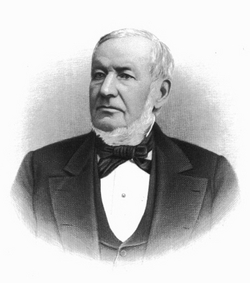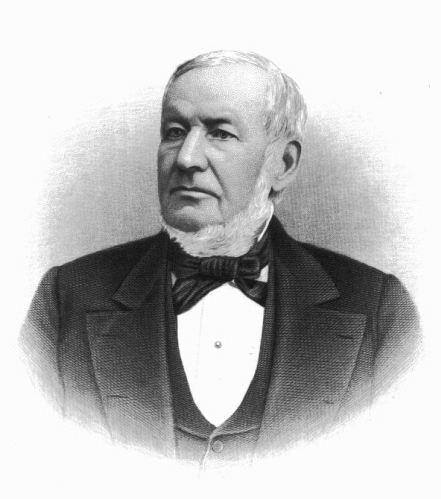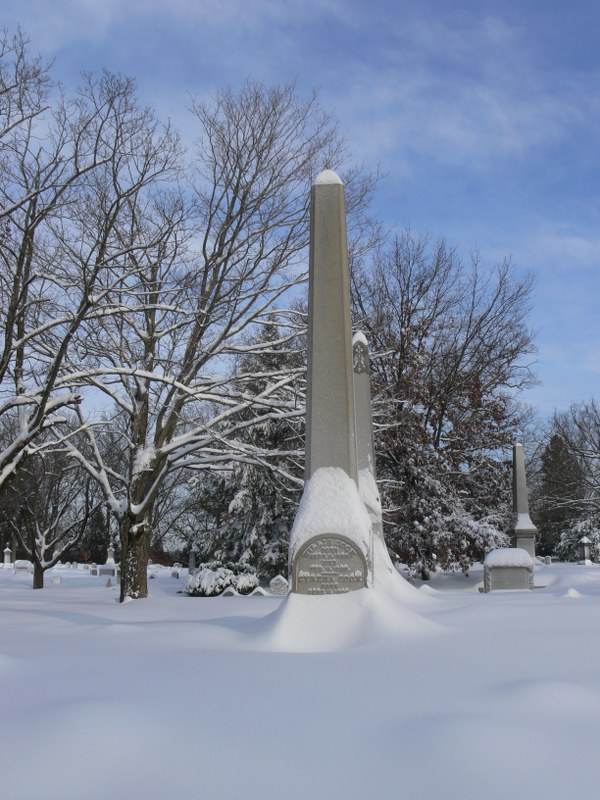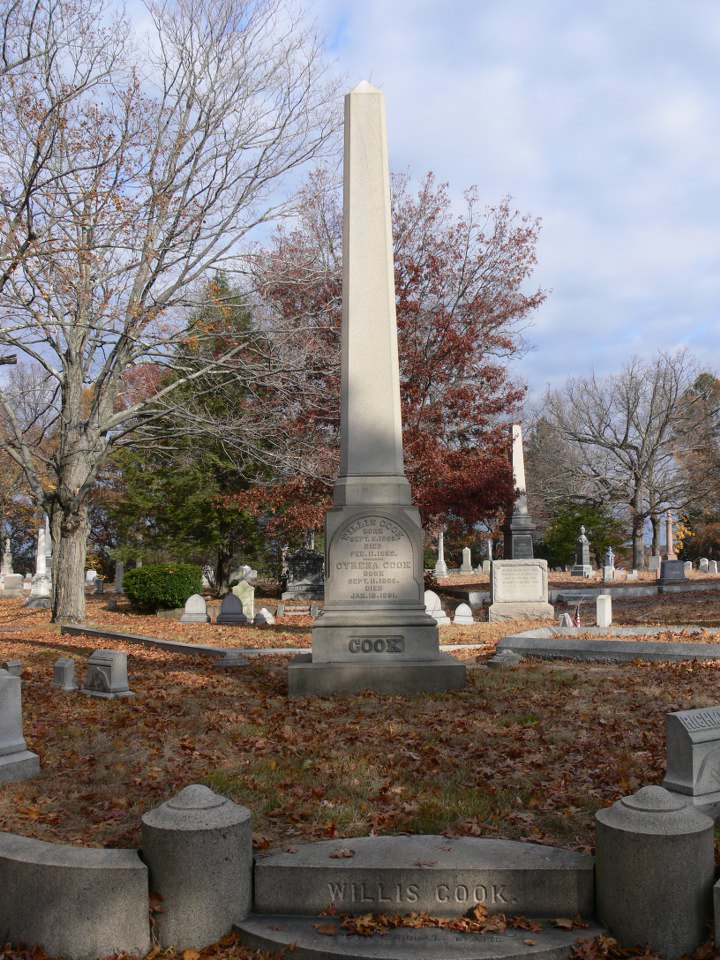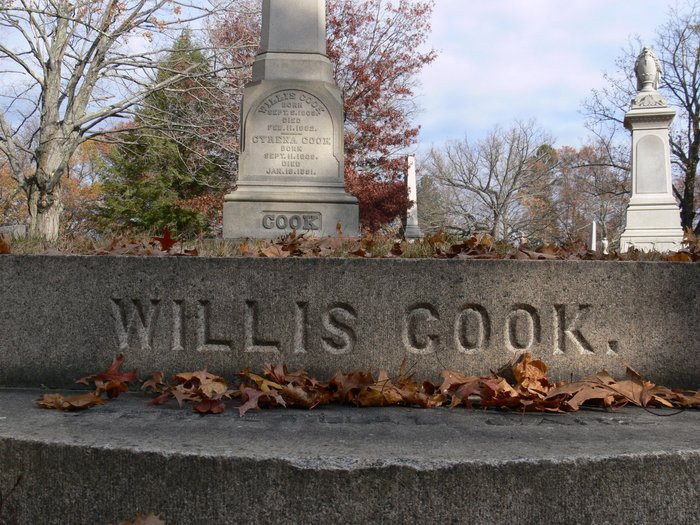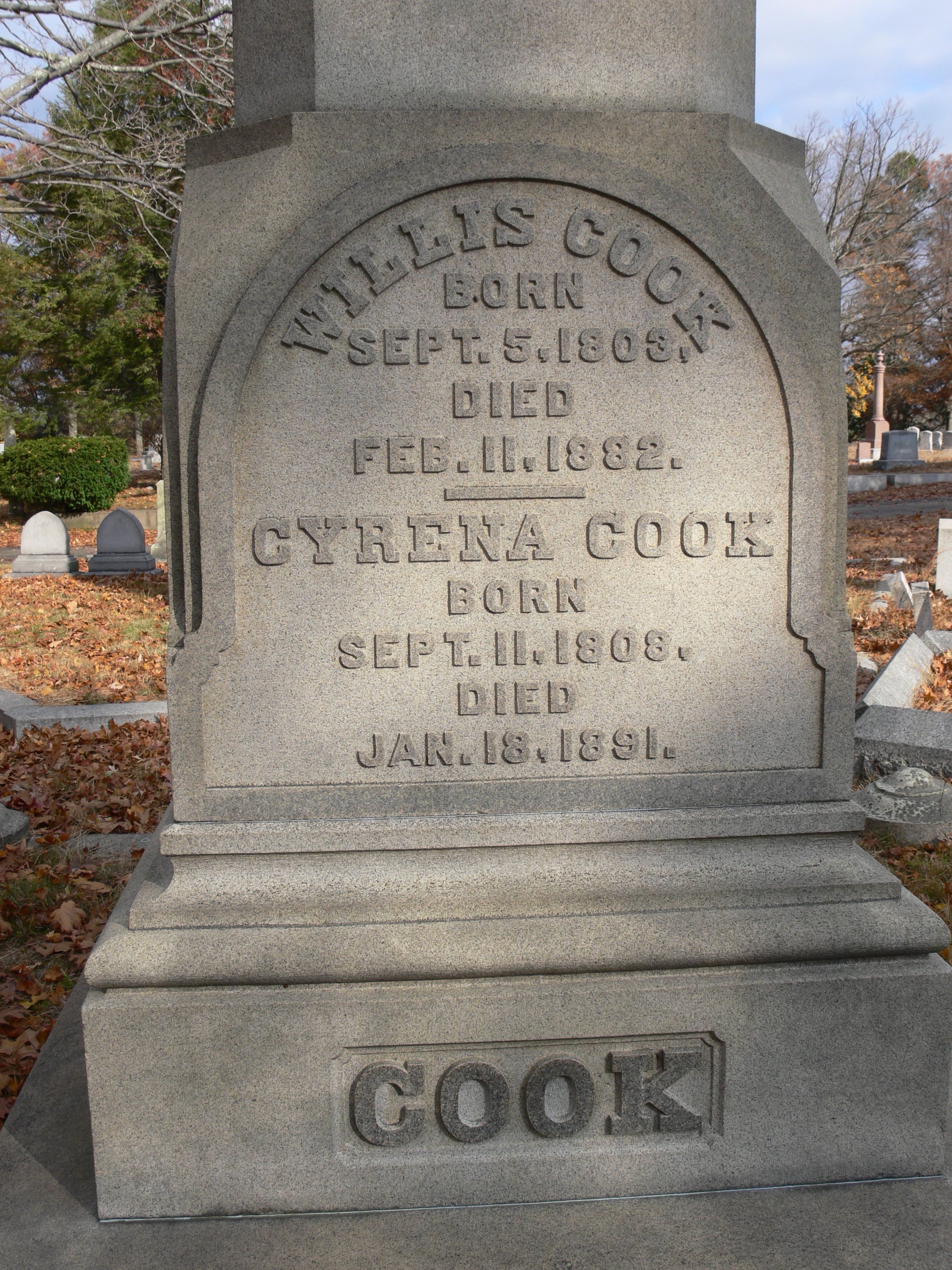Willis was brought up on the farm, and in occasional opportunities for attendance at school on Cumberland Hill, more than a mile distant, which he attended in the winter season. His association with his brother Lyman ripened into an almost life-long partnership, at Woonsocket, covering fifty years of most rapid growth and prosperity of the village and town, with which development they are most closely identified as important contributors.
Commencing when the principal business portion of the village was centered about "The Falls;" when Main Street was only a country road; when the first building north of the house of Paine, the miller (located on the present (1881) site of the National Globe Bank), was Waldo Earle's house, at the "Social," more than half a mile distant, they have lived to see the town in its present thickly settled and prosperous condition, and are still (1881)largely interested and actively participating in its business interests, aiding materially in its further growth.
Leaving home at the ages of seventeen and eighteen, respectively, they learned the machinist's trade, at which they worked, turning their pay over to their father until the last year of their minority. In 1828 they formed a partnership with Willing Vose, for the building of machinery, the style of the firm being Willis Cook & Co. They leased a portion of lot No. i, of the Arnold heirs (the present (1881)site of the Lippitt Woollen Mill), and there carried on a successful business until burned out in 1835, when they leased of Samuel G. Arnold (afterwards Lieutenant-Governor of Rhode Island), and his sister, the lot since occupied by the well-known Woonsocket Furnace Company and then purchased by the American Worsted Company. There they built the foundry and machine shop.
Soon after locating here Mr. Vose withdrew from the company. In 1846 they added to their business the manufacture of cotton goods, pursuing it for twelve years, at the end of which time they leased this mill to other parties for the same business, but continued the foundry and machine works. At the expiration of the first fifteen years' lease, it was renewed, and within the second term they purchased of the Arnolds the whole property, including the large estate on the opposite side of Main Street, where they erected dwellings, store, and office buildings, the last of which, completed in 1868, was what is known as Cook's Block. They sold their mill property in 1868, at which time they retired from the machine business, but retained their other landed estates opposite.
A few years later the co-partnership of nearly fifty years' standing was dissolved by mutual agreement, Willis purchasing the company real estate, and Lyman, who is still(1881) active and enterprising, invested in other manufacturing interests. This long business association is remarkable in its uniform record of integrity and unquestioned financial credit and stability during the whole time. Mr. Willis Cook served as a member of the General Assembly at different times, but did not seek political offices, often refusing when asked to accept them. During the greater part of his business career he was connected with the Smithfield Union Bank, as director, from 1833, and as President of that corporation, now(1881) the National Union Bank, continuously from 1862 to the present time (1881). He was one of the original incorporators of the Woonsocket Institution for Savings, in 1845, with which he has since been officially connected, first as trustee and director, and since 1873 as its President. He has been an active director of the Woonsocket Gas Company since 1858, and of the American Worsted Company since 1876.
Mr. Cook has been interested in the subject of religion from early life. He founded his belief upon the views of universal salvation, as proclaimed by Rev. Hosea Ballou, and through his influence, with that of others, Mr. Ballou, Rev. Thomas Whittemore, and other Universalist divines, were induced to expound their faith to the people of Woonsocket. Mr. Cook assisted in establishing the first Sunday-school in Woonsocket, a union school for all denominations. In 1834, he, with others, was instrumental in organizing a Universalist Society, and, later, the Sunday-school and Church. He was for many years President of the Society, and until 1879, a member of the Prudential Committee, from which position he withdrew on account of failing health. Mr. Cook has been distinguished for immovable integrity and uprightness, for his interest in all matters pertaining to the good of the town, State, and nation, for thoroughness in all that he undertook, and for sound judgment in all matters of business.
He married, July 3, 1828, Cyrena Thayer, daughter of Moses and Anna (Paine) Thayer, of Mendon, Massachusetts. They have had nine children: Eliphalet S., born March 22, 1829; Horace C., born November 13, 1830, died January 22, 1873; Ann Janette T., born April l8, 1833; Madora, born April i, 1835, married R. G. Randall, June 16, 1857; Cyrena J., born August 11, 1837, married J. B. Aldrich, June 9, 1870; A. Olivia, born September 18, 1839, married J. R. Boyden, son of Rev. John Boyden, January 22, 1862; Susan A., born December 9, 1844, married Henry L. Ballou, son of Hon. Latimer W. Ballou, M.C., October 6, 1868; Ednah L., born October 28, 1849, died July 21, 1850; Gertrude, born May 7, 1851, married Richmond A. Bullock, October 10, 1871, died October 4, 1877.
Willis was brought up on the farm, and in occasional opportunities for attendance at school on Cumberland Hill, more than a mile distant, which he attended in the winter season. His association with his brother Lyman ripened into an almost life-long partnership, at Woonsocket, covering fifty years of most rapid growth and prosperity of the village and town, with which development they are most closely identified as important contributors.
Commencing when the principal business portion of the village was centered about "The Falls;" when Main Street was only a country road; when the first building north of the house of Paine, the miller (located on the present (1881) site of the National Globe Bank), was Waldo Earle's house, at the "Social," more than half a mile distant, they have lived to see the town in its present thickly settled and prosperous condition, and are still (1881)largely interested and actively participating in its business interests, aiding materially in its further growth.
Leaving home at the ages of seventeen and eighteen, respectively, they learned the machinist's trade, at which they worked, turning their pay over to their father until the last year of their minority. In 1828 they formed a partnership with Willing Vose, for the building of machinery, the style of the firm being Willis Cook & Co. They leased a portion of lot No. i, of the Arnold heirs (the present (1881)site of the Lippitt Woollen Mill), and there carried on a successful business until burned out in 1835, when they leased of Samuel G. Arnold (afterwards Lieutenant-Governor of Rhode Island), and his sister, the lot since occupied by the well-known Woonsocket Furnace Company and then purchased by the American Worsted Company. There they built the foundry and machine shop.
Soon after locating here Mr. Vose withdrew from the company. In 1846 they added to their business the manufacture of cotton goods, pursuing it for twelve years, at the end of which time they leased this mill to other parties for the same business, but continued the foundry and machine works. At the expiration of the first fifteen years' lease, it was renewed, and within the second term they purchased of the Arnolds the whole property, including the large estate on the opposite side of Main Street, where they erected dwellings, store, and office buildings, the last of which, completed in 1868, was what is known as Cook's Block. They sold their mill property in 1868, at which time they retired from the machine business, but retained their other landed estates opposite.
A few years later the co-partnership of nearly fifty years' standing was dissolved by mutual agreement, Willis purchasing the company real estate, and Lyman, who is still(1881) active and enterprising, invested in other manufacturing interests. This long business association is remarkable in its uniform record of integrity and unquestioned financial credit and stability during the whole time. Mr. Willis Cook served as a member of the General Assembly at different times, but did not seek political offices, often refusing when asked to accept them. During the greater part of his business career he was connected with the Smithfield Union Bank, as director, from 1833, and as President of that corporation, now(1881) the National Union Bank, continuously from 1862 to the present time (1881). He was one of the original incorporators of the Woonsocket Institution for Savings, in 1845, with which he has since been officially connected, first as trustee and director, and since 1873 as its President. He has been an active director of the Woonsocket Gas Company since 1858, and of the American Worsted Company since 1876.
Mr. Cook has been interested in the subject of religion from early life. He founded his belief upon the views of universal salvation, as proclaimed by Rev. Hosea Ballou, and through his influence, with that of others, Mr. Ballou, Rev. Thomas Whittemore, and other Universalist divines, were induced to expound their faith to the people of Woonsocket. Mr. Cook assisted in establishing the first Sunday-school in Woonsocket, a union school for all denominations. In 1834, he, with others, was instrumental in organizing a Universalist Society, and, later, the Sunday-school and Church. He was for many years President of the Society, and until 1879, a member of the Prudential Committee, from which position he withdrew on account of failing health. Mr. Cook has been distinguished for immovable integrity and uprightness, for his interest in all matters pertaining to the good of the town, State, and nation, for thoroughness in all that he undertook, and for sound judgment in all matters of business.
He married, July 3, 1828, Cyrena Thayer, daughter of Moses and Anna (Paine) Thayer, of Mendon, Massachusetts. They have had nine children: Eliphalet S., born March 22, 1829; Horace C., born November 13, 1830, died January 22, 1873; Ann Janette T., born April l8, 1833; Madora, born April i, 1835, married R. G. Randall, June 16, 1857; Cyrena J., born August 11, 1837, married J. B. Aldrich, June 9, 1870; A. Olivia, born September 18, 1839, married J. R. Boyden, son of Rev. John Boyden, January 22, 1862; Susan A., born December 9, 1844, married Henry L. Ballou, son of Hon. Latimer W. Ballou, M.C., October 6, 1868; Ednah L., born October 28, 1849, died July 21, 1850; Gertrude, born May 7, 1851, married Richmond A. Bullock, October 10, 1871, died October 4, 1877.
Family Members
Advertisement
Records on Ancestry
Advertisement
